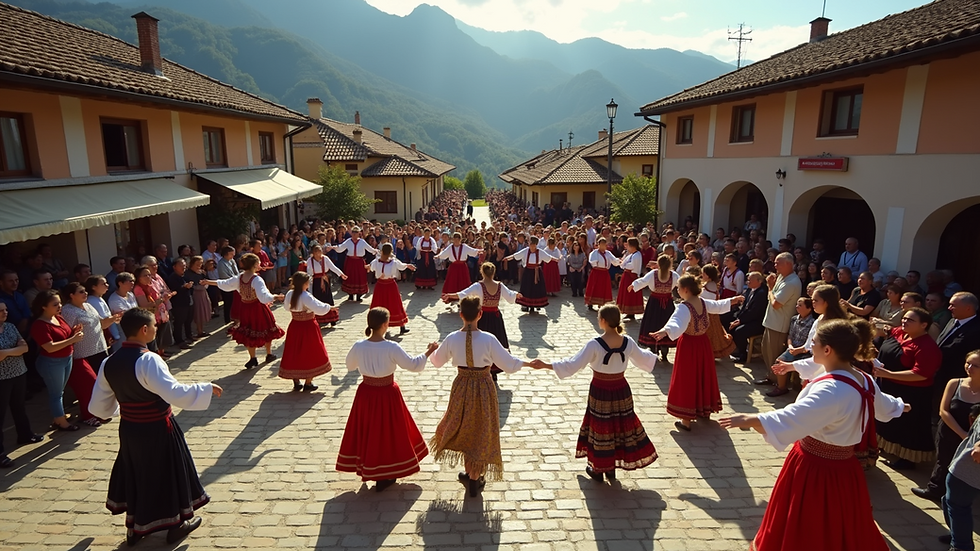Discover the Unique Aspects of Albanian Culture
- ab le
- Aug 11
- 4 min read
Albania is a country rich in history and culture, offering a fascinating blend of traditions and customs that have been preserved through centuries. Exploring these unique aspects provides insight into the values, lifestyle, and identity of the Albanian people. From traditional music and dance to family values and hospitality, Albania presents a cultural tapestry worth understanding. In this post, I will share some of the most distinctive features of Albanian traditions and customs, helping you appreciate the depth and diversity of this Balkan nation.
Albanian Traditions and Customs: A Closer Look
Albanian traditions and customs are deeply rooted in the country’s history and geography. The mountainous terrain and historical isolation of many communities have helped preserve many ancient practices. One of the most notable customs is the concept of Besa, which means a pledge of honor or a promise to keep one's word. This principle governs social behavior and relationships, emphasizing trust and respect.
Family plays a central role in Albanian society. Extended families often live close to one another, and family gatherings are frequent and lively. Weddings, for example, are significant events that can last several days, featuring traditional music, dance, and food. The traditional dress worn during these celebrations is colorful and symbolic, often varying by region.
Hospitality is another cornerstone of Albanian customs. Guests are treated with great respect and generosity, often offered the best food and drink available. This welcoming attitude is a source of pride and reflects the importance of community and connection in Albanian life.

What is the Albanian Culture Known For?
When discussing what the Albanian culture is known for, several elements stand out. First, the rich oral tradition is remarkable. Albanians have preserved their history and folklore through epic poetry and storytelling, often performed with traditional instruments like the lahuta (a one-stringed fiddle). These stories recount heroic deeds, historical events, and moral lessons, keeping the past alive in the present.
Another well-known aspect is the diversity of religious coexistence. Albania is home to Muslims, Orthodox Christians, and Catholics who have lived together peacefully for centuries. This religious harmony is reflected in the country's festivals and public life, where different traditions are respected and celebrated.
Albanian cuisine also deserves mention. It combines Mediterranean flavors with Balkan influences, featuring dishes like byrek (savory pastry), tavë kosi (baked lamb with yogurt), and fresh seafood along the coast. Food is an essential part of social gatherings and celebrations, symbolizing unity and shared heritage.

Language and Folklore: The Heartbeat of Tradition
The Albanian language itself is a unique element of the culture. It belongs to its own branch of the Indo-European language family, making it distinct from neighboring languages. The language has two main dialects, Gheg and Tosk, which reflect the country’s regional diversity.
Folklore is a vital part of Albanian identity. Traditional dances like the valle are performed during celebrations and are characterized by intricate footwork and group formations. These dances often tell stories or represent historical events. Costumes worn during these performances are handmade and decorated with embroidery that carries symbolic meanings.
Music also plays a crucial role. The use of traditional instruments such as the çifteli (a two-stringed instrument) and def (a type of drum) creates a sound that is instantly recognizable. These musical traditions are passed down through generations, often taught within families or local communities.
Preserving Albanian Traditions in Modern Times
In today’s fast-changing world, preserving Albanian traditions and customs is both a challenge and a priority. Many young Albanians are reconnecting with their heritage through cultural festivals, workshops, and educational programs. These initiatives help keep traditional crafts, music, and dances alive.
Tourism also plays a role in cultural preservation. Visitors to Albania are often eager to experience authentic traditions, which encourages local communities to maintain their customs. For example, rural villages host events where tourists can participate in traditional cooking or folk dancing.
Technology has become a tool for preservation as well. Online platforms and social media allow Albanians worldwide to share their culture and connect with others interested in their heritage. This digital presence helps raise awareness and appreciation for Albanian traditions on a global scale.

Embracing the Future While Honoring the Past
Understanding the unique aspects of Albanian traditions and customs offers valuable lessons about resilience, community, and identity. While Albania continues to modernize and integrate with the global community, its people remain deeply connected to their roots. This balance between embracing the future and honoring the past is a defining feature of the country.
For those interested in learning more about the rich heritage of Albania, exploring the albanian culture through local events, literature, and cuisine is a rewarding experience. It reveals a society that values honor, hospitality, and the preservation of its unique identity.
By appreciating these cultural elements, we gain a better understanding of Albania’s place in the world and the enduring spirit of its people. Whether through music, language, or social customs, Albanian traditions continue to inspire and connect generations.
This exploration of Albanian traditions and customs highlights the importance of cultural preservation and the richness of a heritage that has stood the test of time. It invites readers to delve deeper into a culture that is both ancient and vibrant, offering insights that resonate far beyond its borders.






